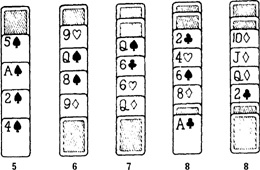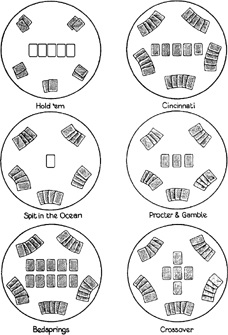The Penguin Book of Card Games: Everything You Need to Know to Play Over 250 Games (178 page)
Read The Penguin Book of Card Games: Everything You Need to Know to Play Over 250 Games Online
Authors: David Parlett

Seventy-Five (75432 of mixed suits), unless it is agreed to count Ace
low, when it is a Sixty-Four (6432A).
Lowbal Here the pot is won exclusively by the lowest hand. In
Kansas City Lowbal , the lowest is a Seventy-Five. In British
Lowbal , Ace can count low, making the lowest hand 6432A,
known as a royal six. In California Lowbal , straights and flushes are
ignored, so the lowest possible is 5432A, known as a wheel or
bicycle.
Seven-Card Draw When fewer than five play the winning hands are
mostly rather dul . They can be improved by playing Seven-Card
Draw. Each receives seven cards, and, in the draw, discards two
more than cal ed for, thereby ending up with a five-card hand.
Strip Poker Whoever has the lowest hand removes an article of
clothing specifiedby the winner. Alternatively, bets are madein
termsof clothing, one article being equivalent to one chip; but this
is suitable only for players in an urgent hurry. The main problem
with Strip Poker is that it is dif icult to tel who has won, and why.
Stud Poker
2-8 players, 52 cards
Stud Poker livens the game up by increasing the amount of
information available and the number of players to eight – or even
more, as several players can usual y be expected to fold before
more cards need to be dealt.
Five-Card Stud (Short Stud)
The dealer antes as many chips as there are players (unless it’s
agreed that everyone antes for themselves) and deals each player a
hole-card face down and an upcard face up. Everyone examines
their hole-card and replaces it face down and half covered by their
upcard. First to speak is the player showing the highest card or, if
equal, the matching player nearest from the dealer’s left. When bets
have al been equalized, a second card is dealt face up, then a third,
and final y a fourth, with a bet ing interval after each. At each deal
the opening bet is made by
the player showing the best combination (pair, three of a
kind, etc.)
or, if none, the player showing the highest card or cards
or, if equal, the player nearest from the dealer’s left.
The game ends on the last round when al but one player have
folded, or when everyone has cal ed or passed, in which case
everyone reveals their hole-card for the showdown.
Canadian Stud
Five-CardStud admit ing four-card straights, flushes and straight
flushes as acceptable hands. A fourstraight beats two pairs, a
flushes as acceptable hands. A fourstraight beats two pairs, a
fourflush beats a fourstraight, and a four-card straight flush beats a
ful house.
Seven-Card Stud (Long Stud)
This variety continues to enjoy world-wide popularity. Deal two
hole-cards and one face up. After a bet ing interval, deal a second, a
third, and a fourth face up, then a third face down, with a bet ing
interval after each. In a showdown, everyone selects the best five of
their seven cards. Can be played Hi-Lo or Lowbal . In Hi-Lo, you
can’t go for low if any of your upcards is higher than an Eight. (‘An
awful hybrid, but for some reason fairly wel spread in Poker circles
in the US and the UK,’ says Dan Glimne.)
Razz
Lowbal Seven-Card Stud.
English Long Stud
A hybrid of Stud and Draw recorded only in British books. Play as
above until everyone has received five cards and the bet ing interval
is closed. Each in turn may then either stand pat or make one
discard in return for a replacement. The replacement is dealt face
down or up depending on whether the abandoned card was down
or up. A bet ing interval fol ows. Anyone who discarded on the
previous round may then either stand pat or make one more
discard, which again matches up or down the card it replaces. A
final bet ing interval fol ows.
Mexican Stud (Flip Stud, Five-Card Turn-up,
Peep-and-Turn)



You get two cards face down and, after looking at them, turn one of
them face up. Each of the next three is dealt face down, and you
may either ‘flip’ it (turn it up) or leave it down, in which case you
flip the previous hole-card instead. Players must flip simultaneously
so as not to influence one another’s choice of flip-card.
Often played as low card wild. (See Wild-card Poker.)
Basebal
One of the most popular of the ‘fancy’ games in domestic circles,
though despised by the experts. The significance of its various
features wil be apparent if you know how America’s national
outdoor sport works, and irrelevant if you don’t, so we’l take them
as read.
Play as Seven-Card Stud. Al Threes and Nines are wild. Anyone
dealt a Three face up must immediately double the pot or fold.
Anyone dealt a Four face up is immediately dealt an additional
hole-card as a bonus, and wil therefore enter the showdown (if he
doesn’t fold) with a choice of five from eight cards instead of seven.
Under these rules (there are variations) the average hand is at least
four of a kind. Experts say it is one of the best games for ‘reading’
tight players.
Stud Poker. From five- to eight-card Stud. In each case the first
bet ing interval usual y occurs after the deal of the first upcard, and
another fol ows each card subsequently dealt.
Chicago
Seven-Card Stud in which the pot is equal y split between the
player with the best hand and the player with the highest hole-card
of the spade suit. The point is to encourage players with weak
hands to stay in the game.
Flop Poker(Hold ’em, etc.)
2-9 players, 52 cards
One or more cards may be dealt face up to the table and counted
by each player as part of their own hand. Such cards constitute the
flop. The most popular example, Texas Hold ’em, is largely
responsible for the phenomenal rise in the popularity of Poker
since the 1990s.
Hold ’em (Texas Hold ’em)
This has been the professionals’ high-stakes game for many years
now and is annual y featured in major tournaments such as The
World Series of Poker and the Carnivale of Poker, both at Las
Vegas.
Deal two hole cards to each player. Bet. Deal a three-card flop
face up and bet again. Then deal a fourth card (the ‘turn’) and fifth
(the ‘river’) face up to the flop, with a bet ing interval after each. At
(the ‘river’) face up to the flop, with a bet ing interval after each. At
a showdown, players may use any five cards out of the seven
comprised by their own two and the flop. If no one can improve on
the complete five-card flop, then no one wins and the pot is shared.
Bedsprings
Deal five hole-cards, bet, then ten flops face down in two rows of
five (see il ustration). The flop cards are faced one at a time with a
bet ing interval after each. Each player counts any pair of vertical y
adjacent cards as part of his own hand, and any five of those seven
as his final hand.
Cincinnati
Deal five hole-cards, bet, then five flop cards face down. These are
faced one at a time with a bet ing interval after each. Each player
chooses any five out of the ten available.
Crossover
Deal five each, bet, then five flop cards face down in a cross (see
il ustration). These are faced, the arms first and the centre one last,
with a bet ing interval after each. Each player counts any five from
the five of his own hand plus either the vertical or the horizontal
line of three in the cross.
Omaha
An informal relative of Hold ’em. Deal two hole-cards each,
fol owed by a bet ing interval, fol owed by five flop cards face up
with a bet ing interval after each. At as how down, players must use
their two hole-cards and may use any three upcards. Often played
hi-lo.

Procter and Gamble
Deal four hole-cards, bet, then three flop cards face down, each of
which is flipped (faced) one at a time, with a bet ing interval after
each. The rank of the third flop is wild.
Seven-Card Mutual
As Omaha, but: two hole-cards, a four-card flop, and a third hole-
card to each.
Flop Poker. Layouts for Hold ’em and other varieties of Poker with
a flop.
Spit in the Ocean
The ancestral game was basical y a variant of Draw designed for
more players at a table. Deal four cards each and one face up to the
centre. This card, the eponymous ‘spit’, counts as the fifth card in
everybody’s hand. For fun, the spit itself, or al four cards of the
same rank, may be designated wild.
Wild-card Poker
2 or more players, 52 cards
Any form of Poker may be played with one or more wild cards. A
wild card is one which its holder may count as any card lacking
from his hand, though sometimes with restrictions. The purpose is
to increase the chances of making the higher and more interesting
combinations, such as four or five of a kind and a straight flush.
Which cards are made wild depends on how many are wanted: the
more there are, the higher the winning hands, and the more
incalculable the mathematics involved. For one wild card, add a
Joker; for two, specify ‘one-eyed Jacks’; for four, any given rank; for
eight, any two ranks; and so on. Wilder stil are variable wild cards
– for example, Stud is often played with a rule that any card
subsequently dealt to a player that matches the rank of his hole-
card is wild, but for that player only.
Although wild cards alter the mathematics, they do not normal y